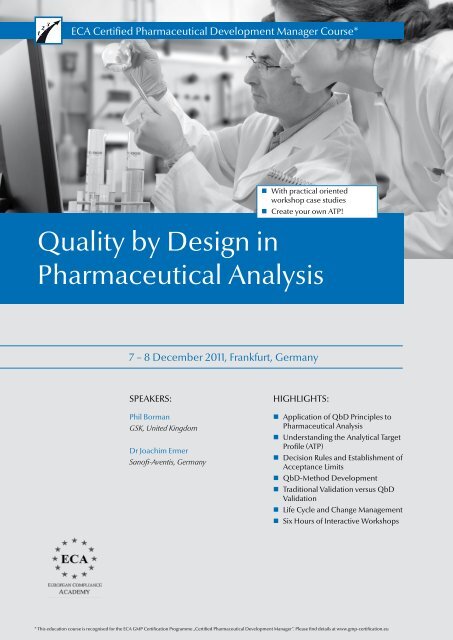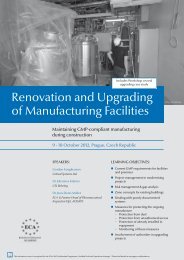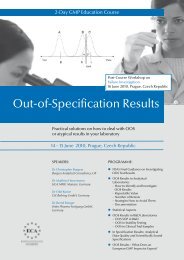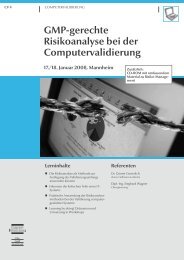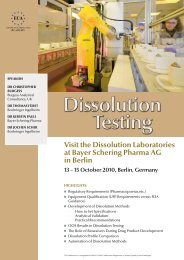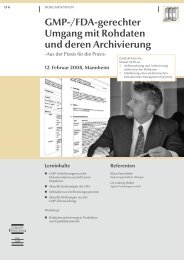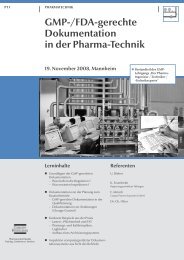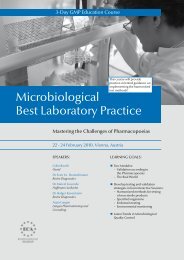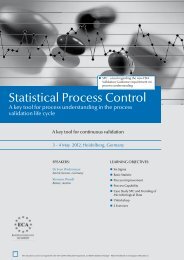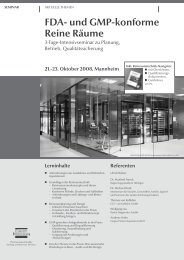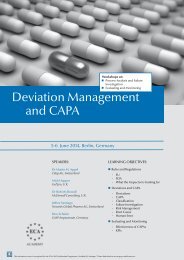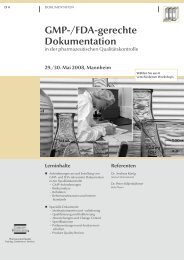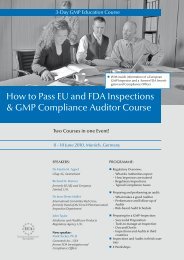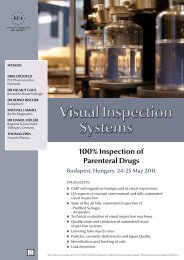Quality by Design in Pharmaceutical Analysis
Quality by Design in Pharmaceutical Analysis
Quality by Design in Pharmaceutical Analysis
Create successful ePaper yourself
Turn your PDF publications into a flip-book with our unique Google optimized e-Paper software.
ECA Certified <strong>Pharmaceutical</strong> Development Manager Course*<br />
• With practical oriented<br />
workshop case studies<br />
• Create your own ATP!<br />
<strong>Quality</strong> <strong>by</strong> <strong>Design</strong> <strong>in</strong><br />
<strong>Pharmaceutical</strong> <strong>Analysis</strong><br />
7 – 8 December 2011, Frankfurt, Germany<br />
SPEAKERS:<br />
Phil Borman<br />
GSK, United K<strong>in</strong>gdom<br />
Dr Joachim Ermer<br />
Sanofi-Aventis, Germany<br />
HIGHLIGHTS:<br />
• Application of QbD Pr<strong>in</strong>ciples to<br />
<strong>Pharmaceutical</strong> <strong>Analysis</strong><br />
• Understand<strong>in</strong>g the Analytical Target<br />
Profile (ATP)<br />
• Decision Rules and Establishment of<br />
Acceptance Limits<br />
• QbD-Method Development<br />
• Traditional Validation versus QbD<br />
Validation<br />
• Life Cycle and Change Management<br />
• Six Hours of Interactive Workshops<br />
* This education course is recognised for the ECA GMP Certification Programme „Certified <strong>Pharmaceutical</strong> Development Manager“. Please f<strong>in</strong>d details at www.gmp-certification.eu
<strong>Quality</strong> <strong>by</strong> <strong>Design</strong> <strong>in</strong> <strong>Pharmaceutical</strong> <strong>Analysis</strong><br />
7 – 8 December 2011, Frankfurt, Germany<br />
Objectives<br />
The aim of this two day course is to provide guidance on<br />
how QbD pr<strong>in</strong>ciples can be applied to analytical methods<br />
and identify the opportunities, not only for new development<br />
products, but also for drugs already marketed.<br />
This course will deal among others with the follow<strong>in</strong>g<br />
questions:<br />
• What are the opportunities of apply<strong>in</strong>g QbD to<br />
analytical methods<br />
• What is the purpose of the PhRMA/EFPIA Position<br />
Paper on analytical QbD<br />
• How can the Analytical Target Profile <strong>in</strong>crease regulatory<br />
flexibility<br />
• Why is it important to have a clear understand<strong>in</strong>g and<br />
expectation of method performance<br />
• What is the impact of QbD on method development,<br />
validation and transfer<br />
• How can QbD also benefit marketed products<br />
A number of <strong>in</strong>teractive workshops will be provided<br />
throughout the two days which will enable delegates to<br />
be able to apply what they have learnt and to discuss the<br />
concepts <strong>in</strong> more detail. Delegates will have the opportunity<br />
to work through the whole QbD process <strong>by</strong> ga<strong>in</strong><strong>in</strong>g<br />
“hands-on experience” us<strong>in</strong>g a number of case studies.<br />
Background:<br />
The pharmaceutical <strong>in</strong>dustry is currently embrac<strong>in</strong>g QbD<br />
concepts to help improve the robustness of manufactur<strong>in</strong>g<br />
processes and to facilitate cont<strong>in</strong>uous improvement<br />
strategies to enhance product quality and manufactur<strong>in</strong>g<br />
productivity. QbD ensures product and process performance<br />
characteristics are scientifically designed to meet<br />
specific objectives, not merely empirically derived from<br />
the performance of test batches. Key QbD concepts are<br />
described <strong>in</strong> ICH guidel<strong>in</strong>es Q8 (R1) <strong>Pharmaceutical</strong> Development,<br />
Q9 <strong>Quality</strong> Risk management and Q10 <strong>Pharmaceutical</strong><br />
<strong>Quality</strong> System. The same opportunities exist<br />
for apply<strong>in</strong>g QbD to analytical methods as they do for<br />
manufactur<strong>in</strong>g processes.<br />
Dur<strong>in</strong>g the course an overview of a position paper written<br />
jo<strong>in</strong>tly <strong>by</strong> PhRMA and EFPIA will be provided which<br />
uses a new concept called the Analytical Target Profile<br />
(ATP). The ATP is a statement that def<strong>in</strong>es the method’s<br />
purpose which is used to drive method selection, design<br />
and development activities. It is hoped that greater cont<strong>in</strong>uous<br />
improvement of methods can also be facilitated<br />
if regulatory authorities agree with and approve the ATP<br />
statement. Each method conform<strong>in</strong>g to the ATP requirements<br />
would be implemented <strong>by</strong> the company’s <strong>in</strong>ternal<br />
change control management system, thus provid<strong>in</strong>g regulatory<br />
flexibility. Risk assessment tools and statistical<br />
methods used to facilitate understand<strong>in</strong>g of the method<br />
performance characteristics (e.g. accuracy and precision)<br />
and their acceptance criteria will also be covered. Traditional<br />
method validation will be compared to a QbD approach<br />
which <strong>in</strong>cludes life-cycle aspects <strong>in</strong>stead of a one<br />
off validation exercise.<br />
Note: In order to fully benefit from the workshops,<br />
attendees should preferably br<strong>in</strong>g a notebook with<br />
Excel®.<br />
Target Group<br />
This course is designed for analytical managers and scientists<br />
who are responsible for perform<strong>in</strong>g or review<strong>in</strong>g<br />
activities like method development, validation, transfer,<br />
operation of methods <strong>in</strong> a QC environment, statistical<br />
evaluation of method performance, analytical change<br />
control etc.<br />
In addition, QA and regulatory affairs professionals will<br />
benefit from this course <strong>by</strong> ga<strong>in</strong><strong>in</strong>g an understand<strong>in</strong>g <strong>in</strong><br />
future CMC trends. This will aid more effective multifunctional<br />
discussions on these topics with<strong>in</strong> <strong>in</strong>dustry.<br />
Programme<br />
Introduction to Analytical QbD<br />
• Overview on proposals of EFPIA/PhRMA Paper<br />
• Analytical Target Profile<br />
• Application of QbD pr<strong>in</strong>ciples to pharmaceutical<br />
analysis<br />
• Change Control and regulatory flexibility<br />
<strong>Design</strong> Intent of the Method – ATP and Bus<strong>in</strong>ess Requirements<br />
• L<strong>in</strong>kage with process control strategy (critical quality<br />
attributes)<br />
• Def<strong>in</strong>ition of ATP<br />
• Method Performance Characteristics and their criteria<br />
• Bus<strong>in</strong>ess requirements of method<br />
Understand<strong>in</strong>g the ATP – Analytical Variability<br />
• Sources of analytical variability<br />
• Method performance characteristics: accuracy and<br />
precision<br />
• Method performance and expectation ranges for<br />
experimental results and statistical parameters<br />
• Decision rules and establishment of acceptance limits<br />
Workshop on Variability<br />
• Application of statistical simulations<br />
• Ga<strong>in</strong> experience (“feel<strong>in</strong>g”) for the consequences of<br />
variability<br />
• Method performance statistical measures for<br />
precision, accuracy, l<strong>in</strong>earity<br />
• Probability of OOS and out-of acceptance criteria<br />
situations
QbD Method Development<br />
• Method design<br />
• Method selection<br />
• Risk assessment<br />
• Control Def<strong>in</strong>ition of method (robustness and<br />
ruggedness test<strong>in</strong>g)<br />
Workshop Risk Assessment<br />
• Use of fishbone diagrams<br />
• Identification of controllable factors, noise factors<br />
and experimental parameters (CNX)<br />
• Use of priority matrix and failure mode and effects<br />
analysis (FMEA)<br />
Traditional Validation versus QbD Validation<br />
• “Translation” of ATP <strong>in</strong>to specific method requirements<br />
• Identification of relevant performance parameters<br />
• Establishment of appropriate acceptance criteria<br />
• Life-cycle approach, on-go<strong>in</strong>g validation<br />
Life-cycle and change management<br />
• Knowledge management system<br />
• Analytical Method Transfer<br />
• Rout<strong>in</strong>e method operation<br />
• Cont<strong>in</strong>uous method verification, change control and<br />
regulatory implications<br />
Workshop Case Studies<br />
Delegates will use background <strong>in</strong>formation provided<br />
on a number of critical quality attributes to construct<br />
their own ATPs. Delegates will be split <strong>in</strong>to small groups<br />
<strong>in</strong> order to discuss how each ATP is applied to a given<br />
method and how each ATP can be used to switch between<br />
alternative methods. The impact of chang<strong>in</strong>g the<br />
method will be assessed for each ATP. Examples of Critical<br />
<strong>Quality</strong> attributes will be used such as<br />
• Identification of an API <strong>in</strong> a tablet formulation<br />
• Assay of drug substance<br />
• Water content <strong>in</strong> drug substance<br />
• Determ<strong>in</strong>ation of degradants <strong>in</strong> drug product<br />
Speakers<br />
PHIL BORMAN<br />
Manager at GSK with<strong>in</strong> Analytical Sciences, Chemical Development,<br />
Stevenage, UK. Chartered Chemist with more<br />
than 13 years experience <strong>in</strong> the pharmaceutical <strong>in</strong>dustry<br />
work<strong>in</strong>g <strong>in</strong> both Chemical and <strong>Pharmaceutical</strong> Development.<br />
Phil first studied at UMIST University (Manchester)<br />
where he obta<strong>in</strong>ed a Masters <strong>in</strong> Chemistry and more recently<br />
obta<strong>in</strong>ed a Masters <strong>in</strong> Industrial Data Modell<strong>in</strong>g<br />
from De Montfort University (Leicester). Phil is also a chartered<br />
member of The Royal Society of Chemistry, UK and<br />
of the EFPIA QbD work<strong>in</strong>g group.<br />
DR JOACHIM ERMER<br />
Head of <strong>Quality</strong> Control Services Chemistry, Sanofi-<br />
Aventis Deutschland GmbH, Frankfurt, Germany. He<br />
studied biochemistry at University of Halle and has about<br />
20 years experience <strong>in</strong> pharmaceutical analytics <strong>in</strong>clud<strong>in</strong>g<br />
development products, global responsibilities as Director<br />
of Analytical Processes and Technology, and Head of<br />
<strong>Quality</strong> Control. He is member of the EFPIA QbD work<strong>in</strong>g<br />
group.<br />
Literature<br />
Social Event<br />
Participants of this Course can purchase<br />
Dr Ermer’s book “Method Validation <strong>in</strong><br />
<strong>Pharmaceutical</strong> <strong>Analysis</strong>” (Wiley VCH,<br />
We<strong>in</strong>heim 2005, ISBN: 3-527-31255-2) at<br />
a 15% reduced price! You will receive<br />
the order form for this book at the<br />
course.<br />
On 7 December 2011, you are cordially <strong>in</strong>vited to a<br />
social event. This is an excellent opportunity to share<br />
your experiences with colleagues from other companies<br />
<strong>in</strong> a relaxed atmosphere.<br />
Wrap up & F<strong>in</strong>al Discussion<br />
The concepts and tools used over the two days will be<br />
summarised and future implications and opportunities of<br />
apply<strong>in</strong>g QbD pr<strong>in</strong>ciples to analytical measurements will<br />
be discussed. Delegates will be given time to ask questions<br />
on how they can apply what they have learnt to<br />
their own analytical methods.
#<br />
Easy Registration<br />
<br />
Reservation Form:<br />
CONCEPT HEIDELBERG<br />
P.O. Box 10 17 64<br />
69007 Heidelberg<br />
Germany<br />
<br />
Reservation Form:<br />
+ 49 6221 84 44 34<br />
@ e-mail:<br />
<strong>in</strong>fo@concept-heidelberg.de<br />
Internet:<br />
www.gmp-compliance.org<br />
+ 49 6221 84 44 34<br />
Reservation Form (Please complete <strong>in</strong> full)<br />
If the bill-to-address deviates from the specifications on the right,<br />
please fill out here:<br />
<strong>Quality</strong> <strong>by</strong> <strong>Design</strong> <strong>in</strong> <strong>Pharmaceutical</strong> <strong>Analysis</strong><br />
7 – 8 December 2011, Frankfurt, Germany<br />
* Mr * Ms<br />
Title, first name, surname<br />
Company Department<br />
Important: Please <strong>in</strong>dicate your company’s VAT ID Number PO Number if applicable<br />
Street/P.O. Box<br />
CONCEPT HEIDELBERG<br />
P.O. Box 101764<br />
Fax +49 (0) 62 21/84 44 34<br />
City Zip Code Country<br />
D-69007 Heidelberg<br />
GERMANY<br />
Phone Fax E-Mail (please fill <strong>in</strong>)<br />
fee will then be calculated accord<strong>in</strong>g to the po<strong>in</strong>t of time at which we receive your message.<br />
In case you do not appear at the event without hav<strong>in</strong>g <strong>in</strong>formed us, you will have to pay the<br />
full registration fee, even if you have not made the payment yet. Only after we have received<br />
your payment, you are entitled to participate <strong>in</strong> the conference (receipt of payment will not<br />
be confirmed)!<br />
General terms and conditions<br />
If you cannot attend the conference you have two options:<br />
1. We are happy to welcome a substitute colleague at any time.<br />
2. If you have to cancel entirely we must charge the follow<strong>in</strong>g process<strong>in</strong>g fees: Cancellation until 2 weeks prior to the conference 10 %,<br />
until 1 weeks prior to the conference 50 %<br />
• with<strong>in</strong> 1 week prior to the conference 100 %. CONCEPT HEIDELBERG reserves the right to change the materials, <strong>in</strong>structors, or speakers<br />
without notice or to cancel an event. If the event must be cancelled, registrants will be notified<br />
as soon as possible and will receive a full refund of fees paid. CONCEPT HEIDELBERG will<br />
not be responsible for discount airfare penalties or other costs <strong>in</strong>curred due to a cancellation.<br />
Terms of payment: Payable without deductions with<strong>in</strong> 10 days after receipt of <strong>in</strong>voice.<br />
Important: This is a b<strong>in</strong>d<strong>in</strong>g registration and above fees are due <strong>in</strong> case of cancellation or<br />
non-appearance. If you cannot take part, you have to <strong>in</strong>form us <strong>in</strong> writ<strong>in</strong>g. The cancellation<br />
•<br />
•<br />
Date<br />
Wednesday, 7 December 2011, 9.00 – 18.15<br />
(Registration and coffee 8.30 – 9.00)<br />
Thursday, 8 December 2011, 9.00 – 15.30<br />
Venue<br />
Welcome Hotel Frankfurt<br />
Leonardo-da-V<strong>in</strong>ci-Allee 2<br />
60486 Frankfurt<br />
Germany<br />
Phone: + 49 (0) 69 770 670 0<br />
Fax + 49 (0) 69 770 670 444<br />
Fees<br />
ECA Members € 1,490 per delegate plus VAT<br />
APIC Members € 1,590 per delegate plus VAT (does not<br />
<strong>in</strong>clude ECA membership)<br />
Non-ECA Members € 1,690 per delegate plus VAT<br />
EU GMP Inspectorates € 845 per delegate plus VAT<br />
The conference fee is payable <strong>in</strong> advance after receipt of<br />
<strong>in</strong>voice and <strong>in</strong>cludes conference documentation, d<strong>in</strong>ner<br />
on the first day, lunch on both days and all refreshments.<br />
VAT is reclaimable.<br />
Accommodation<br />
CONCEPT HEIDELBERG has reserved a limited number<br />
of rooms <strong>in</strong> the conference hotel. You will receive a<br />
room reservation form when you have registered for the<br />
conference. Please use this form for your room reservation<br />
or be sure to mention “VA 6978 ECA Event” to receive<br />
the specially negotiated rate for the duration of<br />
your stay. Reservation should be made directly with the<br />
hotel not later than 9 November 2011. Early reservation is<br />
recommended.<br />
Registration<br />
Via the attached reservation form, <strong>by</strong> e-mail or <strong>by</strong> fax<br />
message. Or you register onl<strong>in</strong>e at www.gmp-compliance.org.<br />
Conference Language<br />
The official conference language will be English.<br />
Organisation and Contact<br />
CONCEPT HEIDELBERG<br />
P.O. Box 10 17 64<br />
69007 Heidelberg<br />
Germany<br />
Phone ++49-62 21/84 44-0<br />
Fax ++49-62 21/84 44 84<br />
<strong>in</strong>fo@concept-heidelberg.de<br />
www.concept-heidelberg.de<br />
For questions regard<strong>in</strong>g content:<br />
Dr Gerhard Becker (Operations Director)<br />
at +49-62 21/84 44 65, or per e-mail at<br />
becker@concept-heidelberg.de.<br />
For questions regard<strong>in</strong>g reservation, hotel, organisation<br />
etc.:<br />
Susanne Ludwig (Organisation Manager)<br />
at +49-62 21/84 44 44, or per e-mail at<br />
ludwig@concept-heidelberg<br />
wa/vers1/141209


